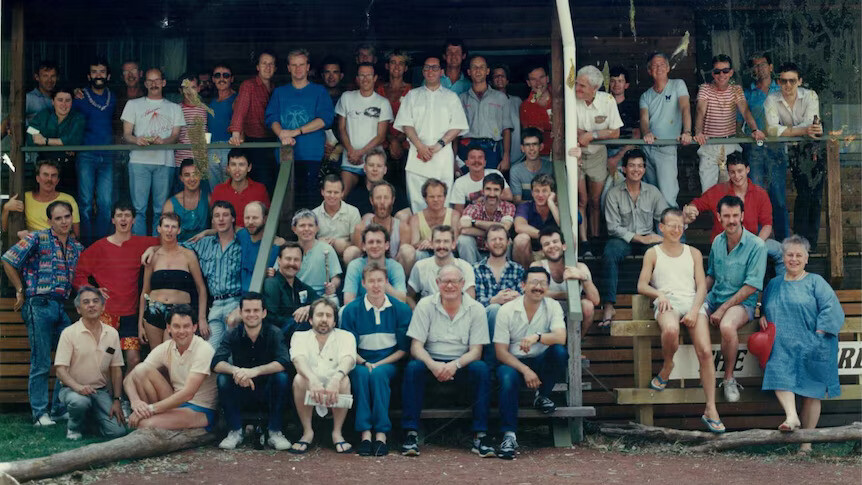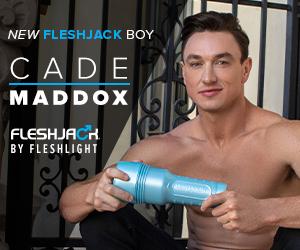I still dream of Ogonon,
I wake up crying…
Wilhelm Reich was a psychoanalyst and doctor of medicine whose bizarre theories of life energy (he termed “orgone energy”), the dangers of patriarchal constructs, sex, and his cloudbusters (a device purported to make rain) led to eventually his literature being banned from interstate shipment in the US.
After continued contempt of these injunctions, he was eventually imprisoned, where he died of a heart condition. Although his legacy is one primarily related to pseudoscience, some of his writings have the flickers of legitimate scientific reasoning.
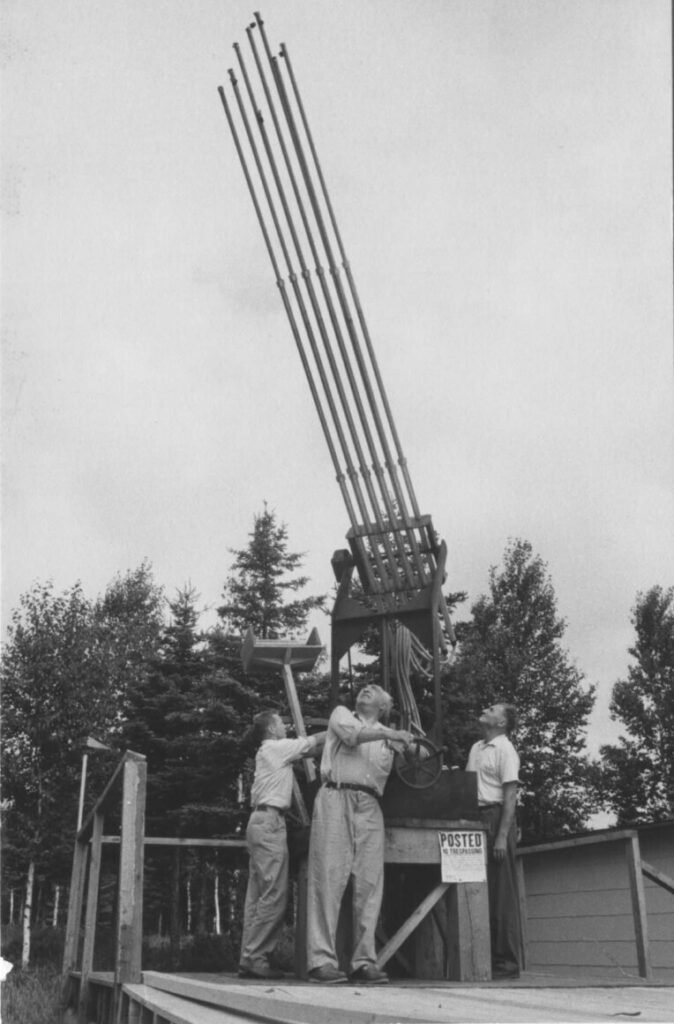
Wilhelm Reich with two unidentified people setting up one of his Cloudbuster Rangeley in Maine during the 1950s. (Wilhelm Reich Infant Trust)
But where his legacy is really felt was through his son Peter Reich’s memoir of his father A Book of Dreams, which inspired the supremely beautiful song by Kate Bush, “Cloudbusting.”
Written from the point of view of an adult Reich looking back at his father’s arrest, it’s a powerful capture of the love he felt for a caring but complex father.
For years I have listened to the song and squished my own relationship with my biological father into it. And as much as he conforms in some respect, my father is a different type of person to me and his love is unseen and at times feels like a phantom.
But recently I finally listened to it and had a new person who took my father’s place. My “queer father” as it were. My friend Ken*.
You’re making rain and you’re just in reach,
When you and sleep escape me…
Ken was a curmudgeon. An old queen of equal parts horrid temperament and deep affection. I met him when I arrived from interstate. I was a pretty boy with a punk attitude. He had no idea I was going to be present that night on his radio show to perform the introduction. After that one night he, for some reason, decided to take me under his wing.
For the next three years I produced his radio show and became one of a number of young queers who both respected him, were frightened of him, but above all, loved him. And he loved all of us.
He had been extremely involved in social policy, particularly in health, and was at the time a professor of health policy at a local university. Through the 80s and 90s he was a key political player in the government health response to HIV and AIDS. His eyes never watered, but there was pain behind his rough exterior as he spoke of those days.
RELATED LINK: Review: 6-Part Docuseries ‘Pride’ May Seem Like Homework, But It’s a Fresh Take on Gay History
He strategically kept his own positive status a secret through the era, which he told me was to ensure he could advocate for policy positions that he covertly desperately needed while allowing the politicians to view it as impersonal. His strategic insight into negotiation and diplomacy within the politics of Australia as a Labor Socialist were phenomenal.
You’re like my yo-yo that glowed in the dark,
What made it special made it dangerous…
He challenged me over my naive assumption at the time to conduct debates on air with people who were, in hindsight, false equivalence (i.e. a climate scientist and a climate denialist). “We are the balance,” he argued to the station managers who advocated for him to be more balanced.
We were one of the only openly skeptical group who discussed diverse topics as if gay marriage was even beneficial for the queer community, or if the ‘born this way’ argument is just pathologizing queerness. He shook me up and criticized me (and others) but never wanted to dismiss. He just wanted you to think more clearly.
So I bury it, and forget
He had blind spots. He was aggressively anti-vegetarian, claiming it was unnatural due to the history of human beings’ reliance on meat. Also, he was quite bi-phobic, which I was always embarrassed and angry about. His dismissal and inability to change his view on them was a disappointment to me and one I was quick to correct him on.
He despised religion in all formats, and had no interest in anything spiritual. He was always a Labor voter, despite their growing appeal to the ring-wing and neoliberalism. His idol was Paul Keating, the straight shooting Prime Minister of Australia of 1991-1996, even though his policies brought along privatization which Ken was opposed to.
But then he would always offer his home if you needed a place to crash. He would share books with you (including this one by his friend and activist David Menadue), play for you music such as Hunters and Collectors, then switch to Shirley Bassey. We saw John Waters in conversation together, we saw his daughter’s film at the Melbourne Queer Film Festival where we ended up meeting Geoffrey Rush. He put me forward for whatever he thought I could do. I sometimes failed, but he never pulled his support.
But every time it rains,
You’re here in my head like the sun coming out…
One Boxing Day, the radio station gave us free reign for a three hour slot to play music and spin yarns. It was one of my favorite times on air. Ken would on air express his distaste at some of my choices but always celebrated those he agreed with. We spoke of our complex relationship with Christmas, him being a rampant atheist and myself a lapsed Catholic. One of the songs was :Cloudbusting.” I cannot remember Ken’s response to it, but I would have assumed it was positive as he respected Kate Bush.
Before I met Ken, he had had a stroke which he recovered from. I remember we were about to attend a burlesque show by an old friend of his and beforehand he told me he was likely going to live at most another ten years. He had no fear in his voice. I was heartbroken.
Ken and his partner moved to live out in the country near his daughter. He continued to do radio. The last time I spoke to Ken he interviewed me for his new radio show over the phone. “Make sure you come up soon,” he told me. I foolishly thought I had all the time in the world to take up that offer.
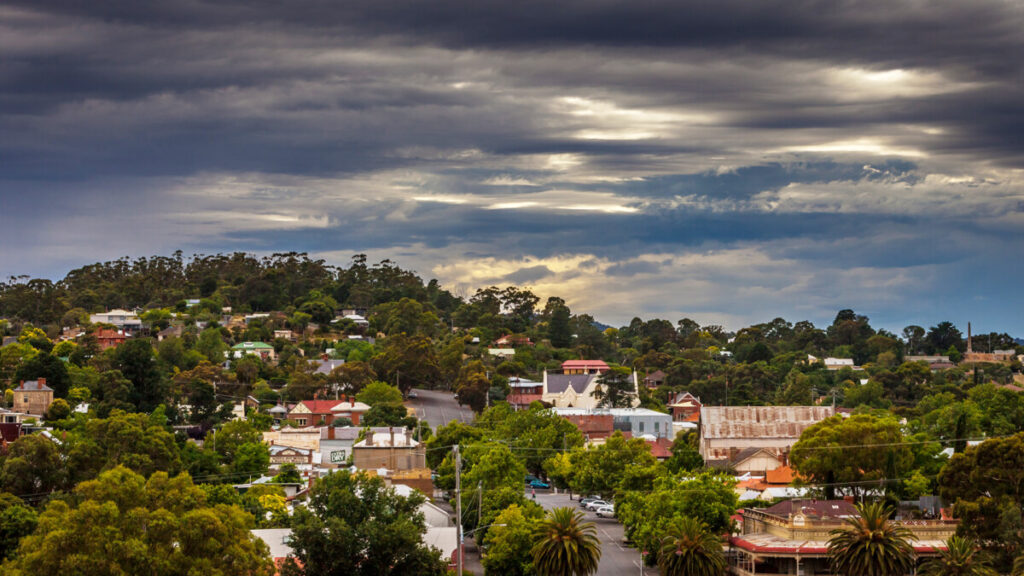
The country town of Castlemaine, 120 kilometers (75 miles) northwest of Victoria. A country town similar to the one Ken moved to. (Richard Baxter Smith)
I just know that something good is going to happen…
Down in the city in the following year, Ken suffered a second stroke. He had made it abundantly clear he had no desire to be revived or to recover. He had had his time. His daughter called me and asked me to come to say goodbye. She knew, although I wasn’t family, he had made me a part of the family. I was so touched he thought of me still like that.
Ken was asleep in the hospital, he was so overflowing with life, that his stillness was eerie. I sat there staring at his face, bereft of its quick cheek and sharp tongue. His spark was still there, if inhibited by his body.
RELATED LINK: Sydney Mardi Gras, 78ers and the Presence of the Police Uniform
My greatest regret was not having the courage to wait to see his eyes would open again, and let him see me. I should have stayed to say goodbye, for him to hear my voice, and to hear how much I loved him. How I was so fortunate to have him in my life. I was such a coward that day. It is the regret I will never get over.
The last noise he apparently made was when the nurse asked if he wanted any pastoral care from a priest or another spiritual person. He growled in defiance.
I don’t know when,
But just saying that could even make it happen.
He died a week later. His funeral was attended by a select group of people. He was cremated with a ceremonial large brimmed hat and handbag, apparently a rite of passage for some of the old activist queers in Melbourne. We all wore red, the color of the AIDs ribbon, in honor of his service. Thorne Harbour Health (formerly the Victorian AIDS Council) were permitted to collect donations throughout the day in honor of Ken.
Earlier in the day, a prominent HIV activist and porn actor shared his thoughts on Ken’s passing through his Facebook. I was angered by them. He seemed dismissive of Ken, as if his wisdom was irrelevant and undesired. He spoke of him like he was in the sidelines.
At the wake later in the day (held in a theater to accommodate all the mourners) there was an opportunity to share our thoughts. I don’t know if Ken wanted me to, but I know he would not abide people disrespecting his commitment to the next generation. I strode up to the lectern.
“People say he was of his time and a product of the past. I have never met a man more interested in the future. He nurtured us, he challenged us, and he challenged me specifically to be critical of the conditions of the world. To speak truth to power, and to mentor and grow our next generation of queers. Thank you Ken, I love you.”
The aforementioned activist who was present was not happy. And I knew that Ken would be proud of that.
RELATED LINK: Crucial Crossroads: Safeguarding Access to At-Home HIV Testing Now
But just saying it could even make it happen…
Ken thrilled me with his intelligence and his strength. He had no time to suffer fools, and would be your greatest advocate. He had faith in me to rise to the challenges of managing him on air with his tangents, his insults and his stories (he still says him and Keating shared a urinal once, no funny business but apparently some words on their members were exchanged.)
We as queers get to choose our family, our elders are the connection to our culture. They challenge you, they nurture you. Ken is not the last or even the first of these queer elders I have had to great fortune to meet in my life. I am forever thankful and grateful he was willing to share some of his life with me who he treated as both a mentee and as an equal.
So, as the rain fell and the marching chords of the Medici Sextet whirled its way through my ears, Ken’s wicked smile and naughty eyes came marching alongside. I remember him sauntering into the radio studio, hugging me roughly with dog hair and dandruff getting all over me. And I weep tears of joy and sadness.
But I know that, because of him, something good is going to happen.
*name changed to protect anonymity of the author.
Sources: ABC News, AK Press, Allen & Unwin, Australian Queer Archives, Balkan Insight, NYU Press, Thorne Harbour Health, Youtube
Get real time update about this post category directly on your device, subscribe now.

